Stories Blog / Stories / Thrive Magazine
Pride Across Borders
An Edmonton documentary travels to Poland, sparking global dialogue on 2SLGBTQ+ rights

I’m pretty sure my response was “you know I’ve never directed a documentary before, right?” Three years ago, I got an email from Andrew Paul, Marketing and Communications Advisor with Edmonton Community Foundation, asking if I was interested in doing just that. Did I want to direct a documentary about Vriend v. Alberta — Canada’s first successful Supreme Court ruling on gay rights? This truly Edmonton story about a man fired for being gay, and his battle with the province of Alberta to have his equality recognized and protected, marked a profound change in Canadian society.
After being screened at film festivals across North America, our award-winning documentary Pride vs. Prejudice: The Delwin Vriend Story was about to cross the Atlantic for its European premiere at the 16th Poland LGBT+ Queer Film Festival, at the invitation of the Canadian Embassy. This screening was a unique opportunity for diplomatic outreach, and so our team of producers and creators headed to Warsaw to connect with activists, politicians and ambassadors to explore the challenges facing generations of Queer lives.
THE CANADIAN EMBASSY
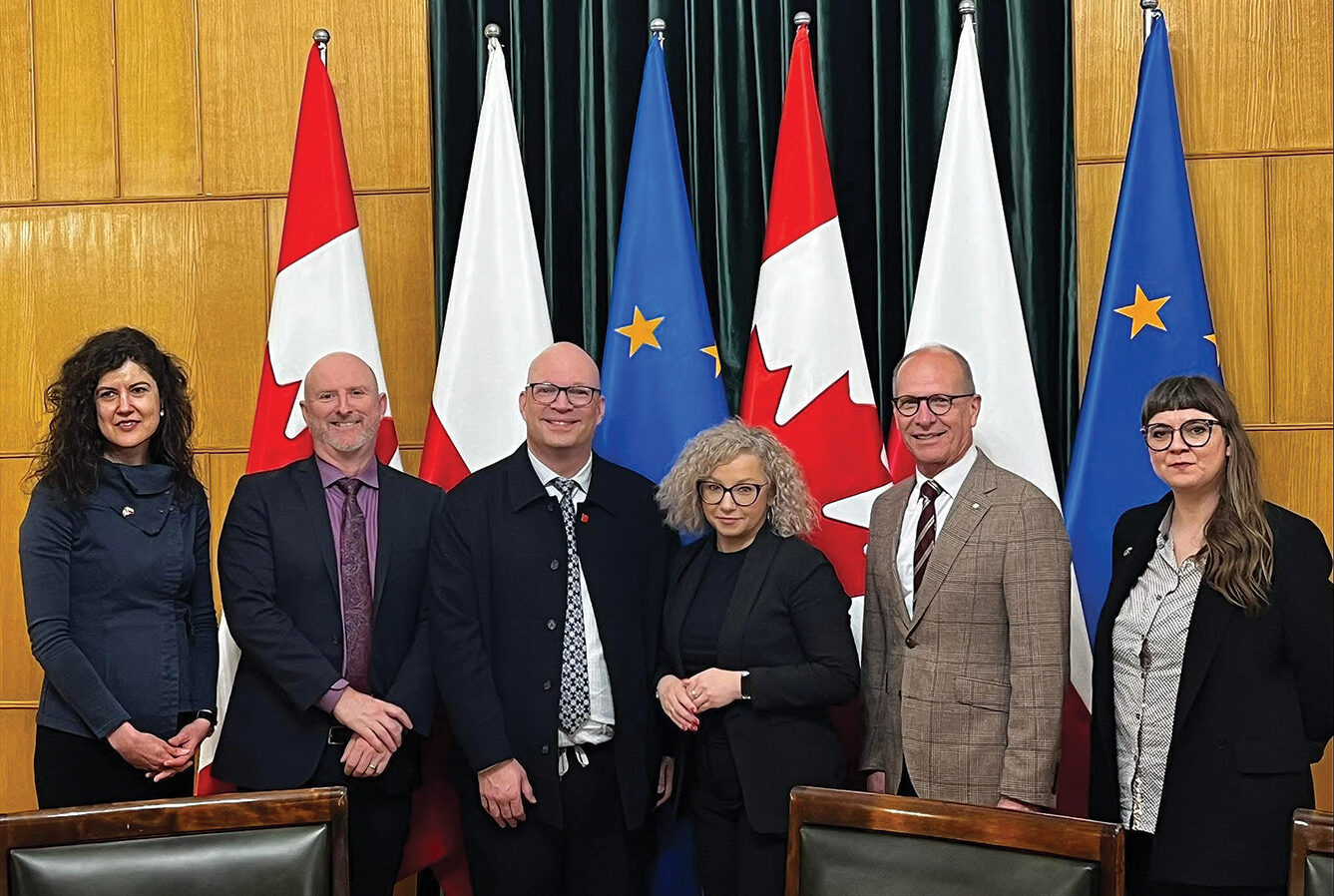
A sign at the front gate of the Canadian Embassy says “No Cameras.” It’s spring in Warsaw, and the green is new and bright. Inside, it’s basic — meeting rooms and beige wood panelling. I grab a coffee (no fancy espresso machine here — just a simple drip, in respect of taxpayers no doubt!) and wait with the team for Catherine Godin, the Canadian Ambassador to Poland. Our delegation includes Executive Producer Doug Stollery; Director, Stollery Charitable Foundation, Scott Graham; Canadian Senator Dr. Kristopher Wells; Executive Director of Dignity Network Canada, Doug Kerr; Andrew Paul and me. Ambassador Godin sweeps in with friendly energy and sets the stage for our visit. The film was invited to Poland, thanks in part to the Dignity Network, for an eight-city screening tour as part of Canada’s work as the current chair of the Diplomats for Equality initiative, founded in 2019 in Vienna by diplomats from 35 countries. We are briefed in detail on the state of equal rights in Poland — specifically about LGBTQ+ equality and the pivotal moment the community faces as part of a contested presidential election.
THE NEXT GENERATION
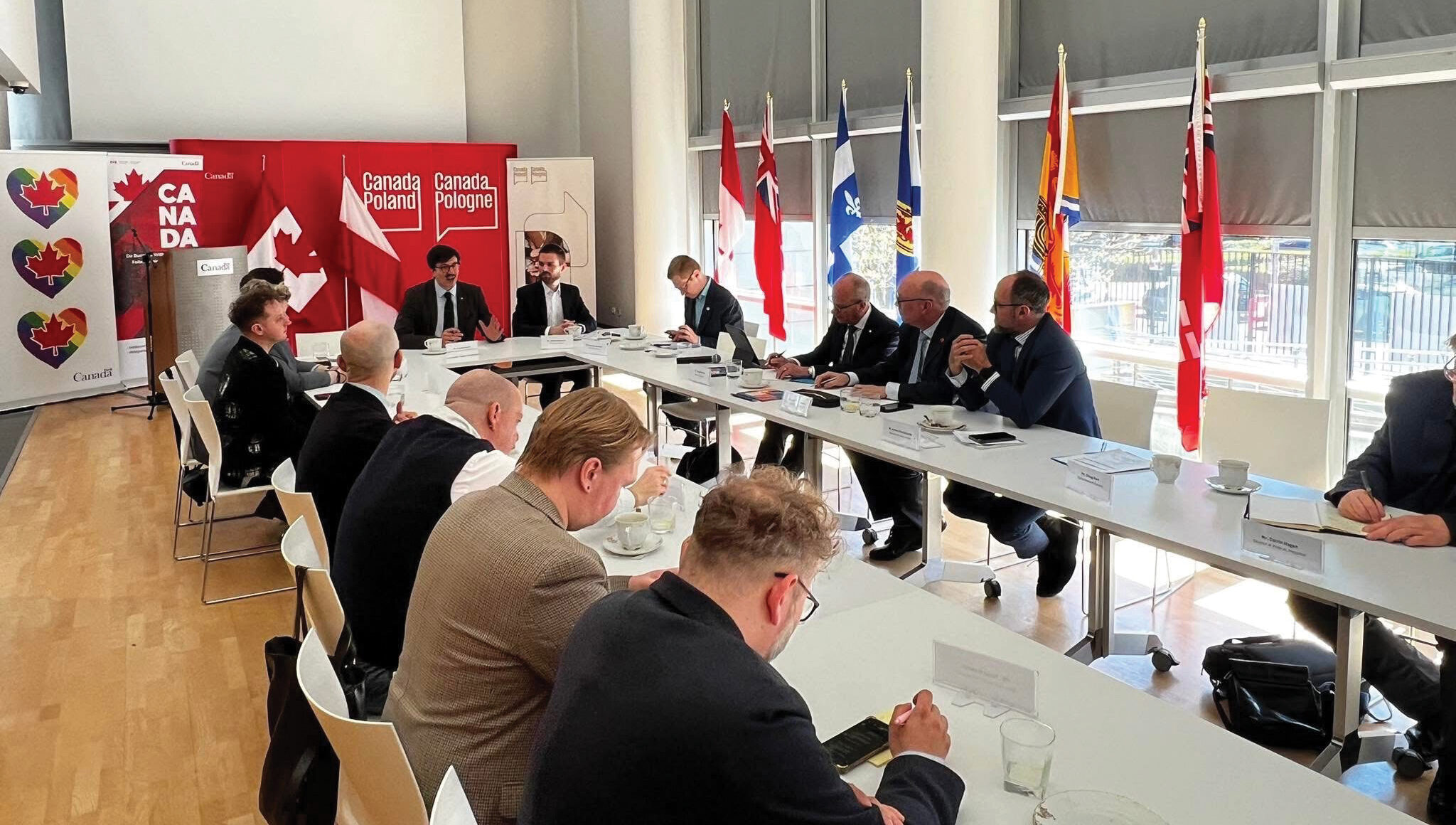
We move to another room, one that feels much more like I had imagined a room at the embassy would look — large windows, sun streaming in through the green space outside, and two long tables with place markers. We are meeting with a group of Polish activists — community group leaders, filmmakers and drag performers. All of them are passionate about the world they can imagine — the world they can see emerging in other places. Poland still doesn’t recognize marriage equality. But Canada and Poland share many common concerns, like the rise of extreme-right politics, and its accompanying baggage of anti-trans discrimination. Canada is just about to elect a progressive government which bucks the current drift to the right in many other places; Poland’s Presidential election is imminent, and there is a lot riding on it.
The flags of both nations hang on the wall … both red and white. Blood and snow. We are excited to share our own nation’s strategies and wins, even as we acknowledge there are still challenges. Pride vs. Prejudice shows that even seemingly insurmountable odds can be beaten. The message resonates, and we recognize that their battle takes place in a different world. In Canada, activists utilized the judiciary to gain equality. In Poland, the Supreme Court was tainted by autocratic regimes, forcing activists to consider other means to change their world.
LAMBDA WARSAW
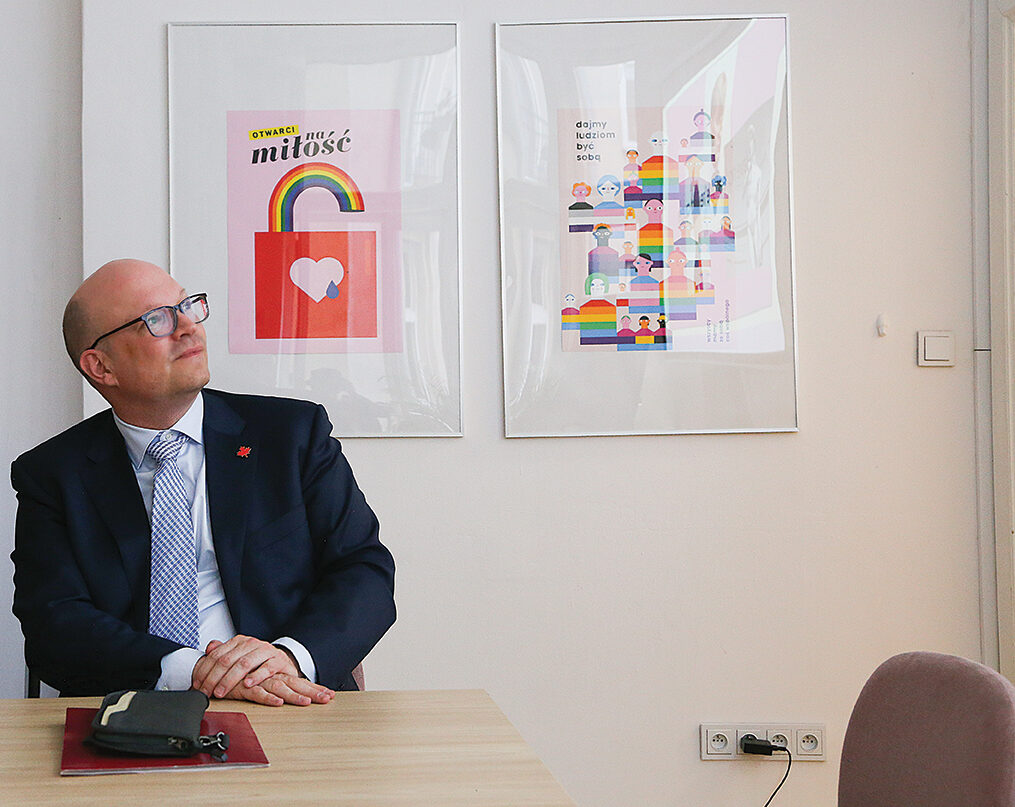
Our visit to the humble third-floor LAMBDA Warsaw office and community gathering space reveals the headquarters of the oldest LGBTQ+ organization in Poland — with nearly three decades of positive outreach to its credit. We are welcomed by Milosz Przepiorkowski, who has been the head of LAMBDA Warsaw for much of its existence. Similar to our own Pride resources in Edmonton, LAMBDA began as a phone-help line, gradually expanding to offer an emergency intervention hostel, and legal and psychological counselling. The meeting space we are in hosts a myriad of Queer organizations in the city including a students’ group, a seniors’ group and a group called Faith and Rainbow for LGBTQ Christians. The work is essential, positive and worthy… and then Milosz brings us back to reality.
“Warsaw is our little rainbow bubble … In Warsaw I see young, samesex couples walking hand in hand in the streets. Very colourful people, open people.”
But the reality is that much of the rest of Poland, while evolving in the right direction, is still struggling with the slow progress towards Queer equality. We are introduced to the first trans MP ever elected in Poland, Anna Grodzka. She was the only current openly trans MP in the world when she was elected in 2011. An icon of the Queer community, she shared the story of her political battle, and her insights about the polarized politicization of trans rights. Grodzka becamean activist in 2011, when the left-leaning Movement Party asked her to enter the political fray.
“Our mission back then was to tell people that transgender people exist in the world; that they deserve exactly the same treatment and respect as other people,”
What resulted was a history-making electoral victory, and four years as an MP — the first two with the Movement Party, and when Grodzka felt like she couldn’t speak independently, ran a second time as an independent candidate and won again. The job came with risks. “Now, nobody was protecting me,” she says. “The press in Poland led a coordinated attack on me.” In reflection, she feels she accomplished her mission to create an environment where trans people could safely follow their true paths. “And I think that although there is some oppression, they are happy.” Grodzka has now left politics behind. “It changed my way of life,” she reflects. “But some jobs are done when they’re done.”
QUEERMUZEUM
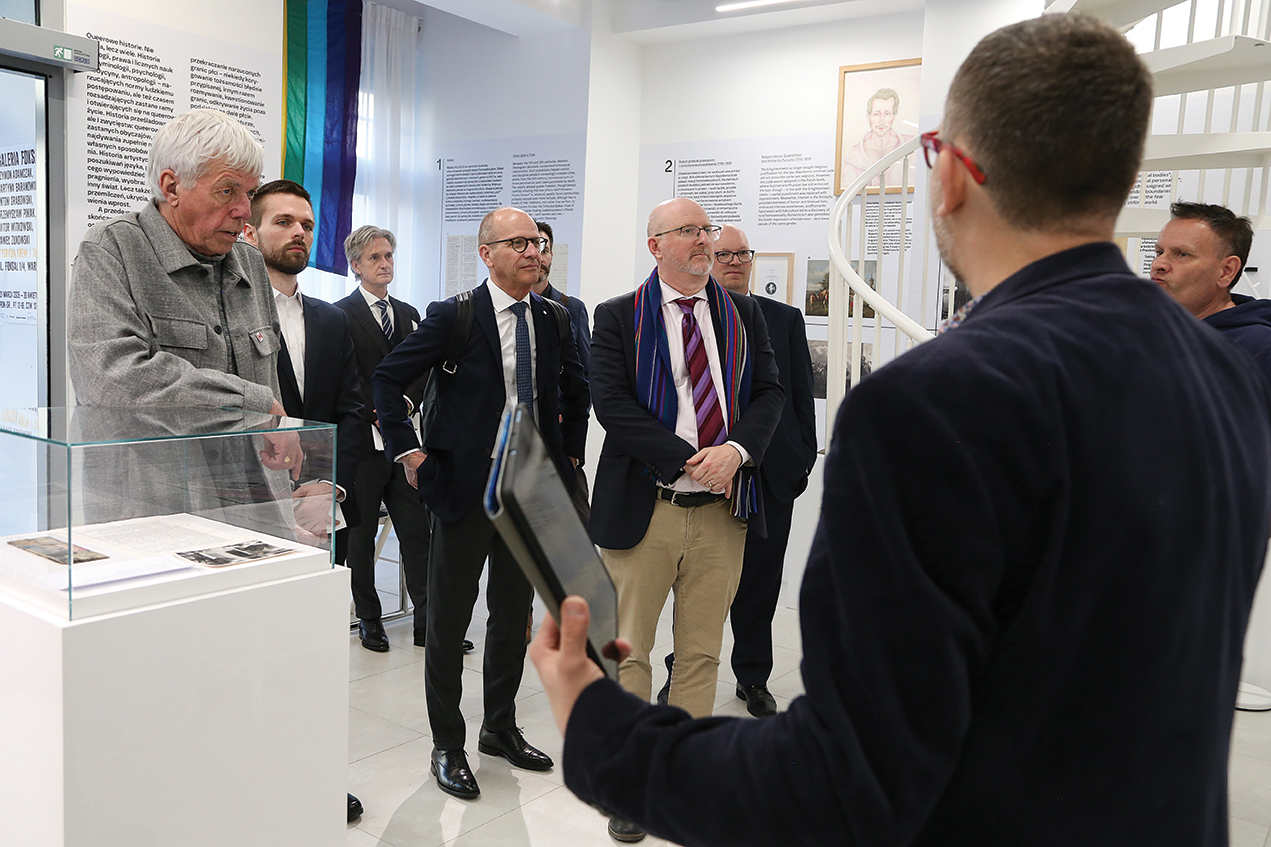
We headed down Marszałkowska Street and entered a small storefront — one of the world’s only Queer history museums. The black and white portraits on the walls look into the camera, into our eyes, revealing the presence of our borderless, shared Queer nation across centuries. Guides lead us through hundreds of years of Queer history in two languages. The English-speaking
guide is introduced as Milosz’s husband, even though the word can’t legally be applied to their partnership under the current laws. Once punishable by burning at the stake, Poland’s laws regarding homosexuality shifted to imprisonment when the Orthodox Church was pushed aside as three conquering nations annexed all of its territory. The Poland that re-emerged post-annexation kept these laws in place, but the tone towards Queer life was cautiously tolerant.
Despite being a fairly progressive culture in the early 1900s (age of consent laws didn’t discriminate against same-sex unions, for example) and the influence of German LGBTQ+ advocate Magnus Hirschfield, Poland’s early promise was shattered during Nazi Occupation. The ghost of the Holocaust looms with memories of lives lost, when millions of Jewish people and scores of others, including homosexuals, were deemed as “subhuman,” and murdered in concentration camps.
In Pride vs. Prejudice, there is a memorable clip of Lyle Kanee in 1997 when he was speaking to the Supreme Court of Canada on behalf of the Jewish Congress of Canada, who acted as one of many intervenors in the case.
“… it is uncomfortable for the Jewish community to be distinguished by being granted protection from discrimination while others who have shared experiences of victimization are not. Many doors previously closed to Jews have been opened with the passage of human rights statutes, but can Jews in good conscience enter through those doors when other minorities who have suffered with them are required to remain behind?”
Liberation from the horrors of war was only for some. The oppression of sexual and gender minorities continued post-war, as Soviet rule harshly kept Queer life in the shadows. When Soviet occupation finally faded in 1991 and Poland held its first parliamentary elections since the 1920s, the Catholic Church reestablished its oppressive hold on Poland’s morality.
WARSAW UNIVERSITY
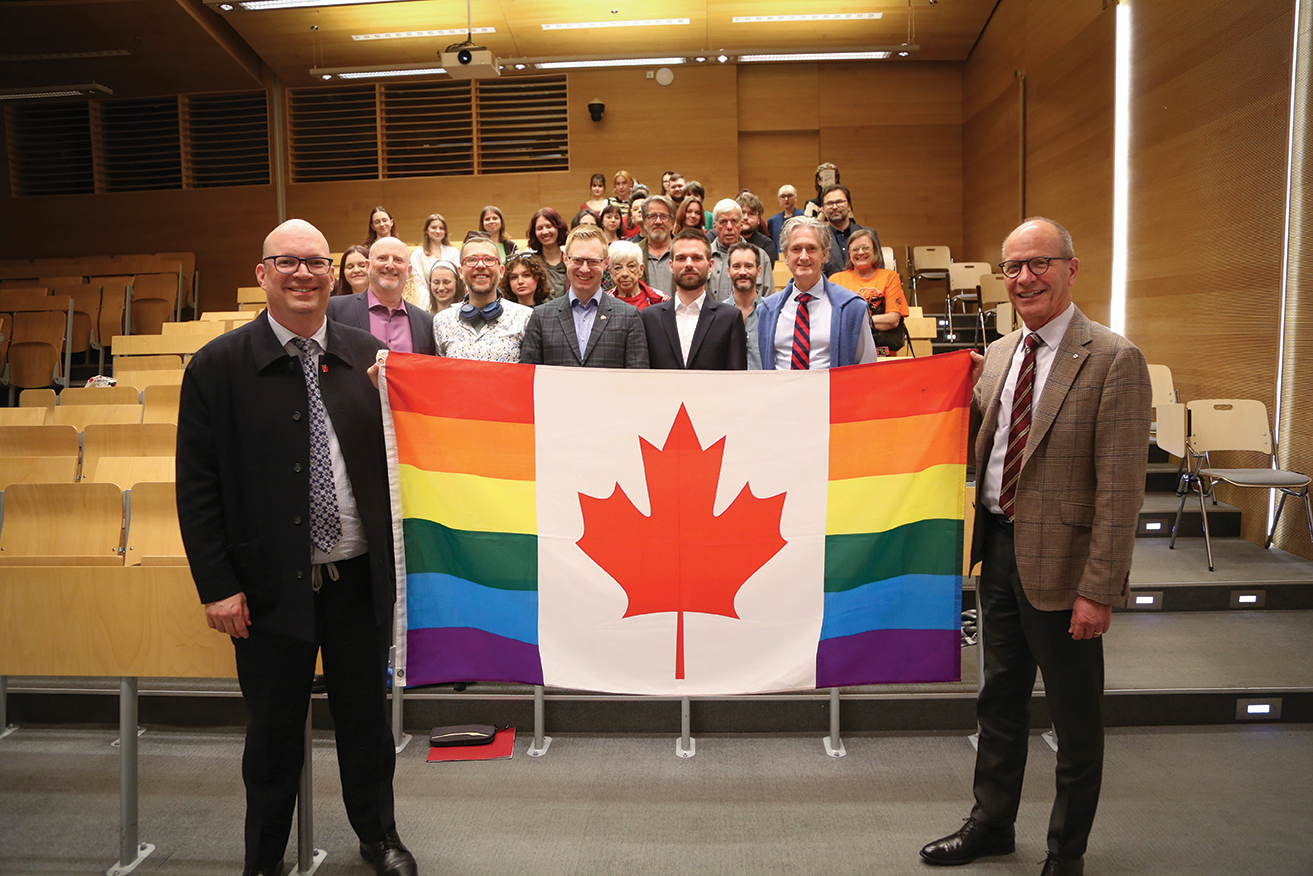
The next afternoon was a special screening of our film for students at Warsaw University, introduced by Doug Stollery, Doug Kerr and Senator Wells. Casa, a student at the French Studies Institute, asks the first question after the film — poignantly outlining the situation for so many young adults.
“I would just like to ask, how do you find the power, the strength and the energy to keep fighting those fights, to finally be able to be considered just as a human being? … I feel like I’m a very passionate advocate for the community. And sometimes I just feel so sick that my existence is just a political conversation over dinner. How do you keep fighting?”
Doug Kerr reaches into his own experience for his reply. “This morning we were in the Canadian embassy and we met some young Polish activists who work on LGBTQ rights in schools here in Poland. And they were dynamic and they were determined, and they reminded me of me when I was 20 … you keep doing this work. And that’s what gets me inspired. I work with people all around the world … every place I go, I meet young people who are doing this work. And that’s what gives me hope … it is you that will give me hope.”
OPENING CEREMONIES
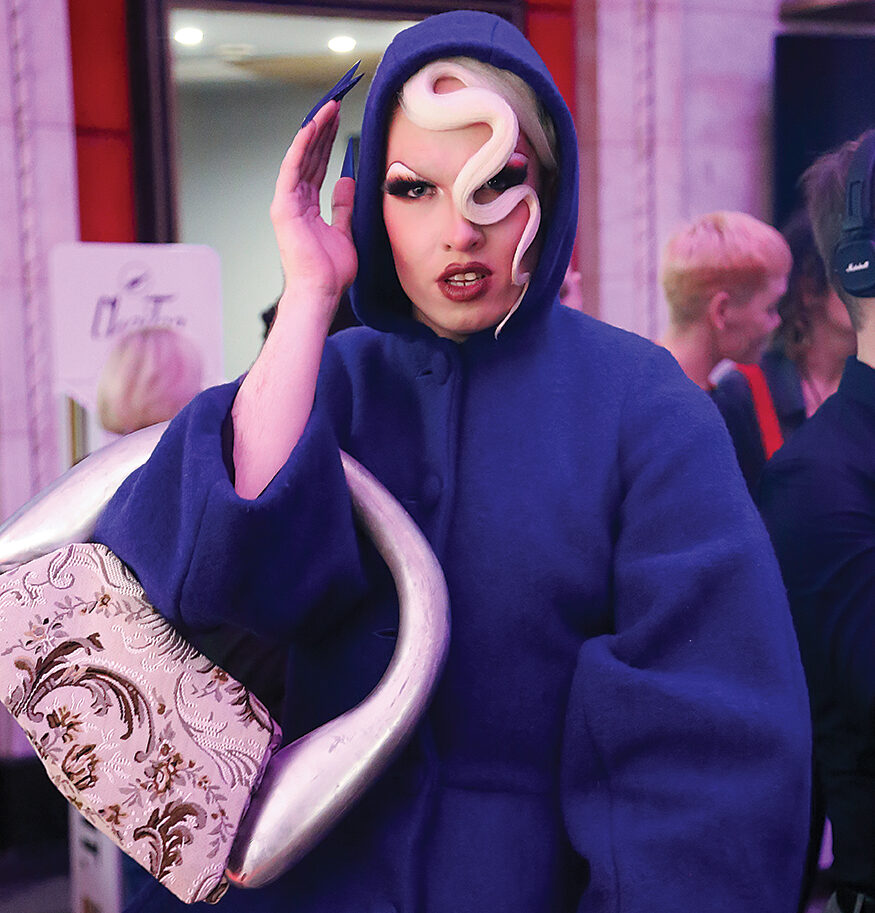
On opening night of the Poland LGBT+ Film Festival, I was prepared for a restrained event, knowing that Poland remains near the bottom of the list of EU nations when it comes to Queer equality. Instead, our team was treated to a glittering evening of Warsaw’s activist, drag and Queer communities, bejewelled in a manner to rival the most glamorous drag balls from home. I stopped worrying about Poland‘s Queer population for a moment. In spite of the oppression and repression of their culture and rights, the vibrancy of a community, thriving in defiance and solidarity, was tangible, and sparkled in the glitter of the fiercely creative queens strutting on the red carpet, reminding me of how I found my own footing in 1980s Alberta.
I was transported back in time: sitting with my husband and my first roommate on the concrete steps, massive columns framing the excitement. We smoke and laugh, marveling at the epic drag creations, and the hundreds of joyous Queers of every possible persuasion. The air is warm, and a welcome escape from the humid and throbbing intensity of the party indoors. I’ve been here before. It’s the 2025 Polish doppelgänger to the notorious Flashback loading dock: Queers and queens and cigarette smoke. The joy collected in one place is moving and inspiring. Queer joy refuses to be legislated out of existence. It erupts in the most difficult circumstances, in the most challenging of locales, making even austere Communist concrete fabulous.
EUROPEAN PREMIERE
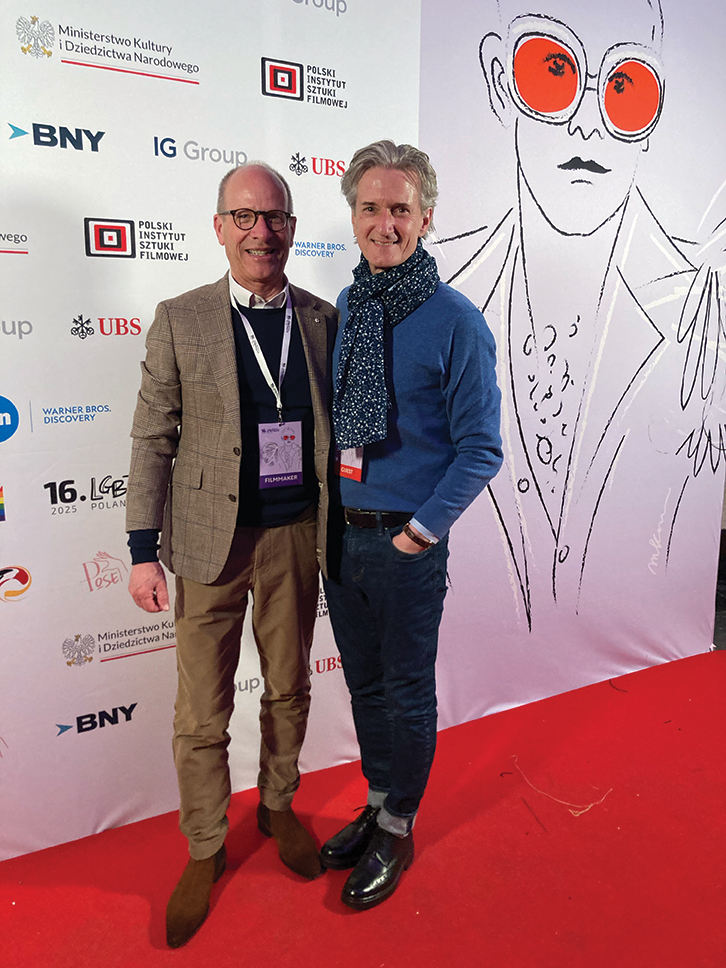
Finally, our screening: the European premiere of Pride vs. Prejudice: The Delwin Vriend Story. A packed theatre, and my first time seeing the film with Polish subtitles. Our Edmonton skyline, our Edmonton story is on screens in Europe. I can feel the film hitting the audience in all the right ways at all the right moments. The sounds of shock at the disrespect shown by one of the judges, the laughs and the tears. This story of courage, persistence and resistance transcends languages and cultures.
The moderator’s first question is about the quote at the beginning of the documentary. “Our rights are not handed to us. We have to fight for them.” She wants to know what its significance is and why I lead into the story with such a statement of finality. I struggled to recall my reasoning at the time: the three years since we began the long process of capturing this story is a blur, with giant steps backward in society as we move forward in time. I recall being frustrated by the complacency I was seeing in the next generation of the community, and our collective lack of insight into the struggles and battles that created decades of relative ease for urban white North American Queers, and how essential it was that they become aware of the invisible heroes among us,
because our story is still mostly untold. I think of the dozens of articles and plays about Queer history that I’ve written in the last decade, and how almost every one of them ended with a call to vigilantly protect and defend the simple freedoms we had gained … as if I was already sensing how easily they could be eroded.
That quote speaks clearly to my deepest fear, my darkest concern — that it could all vanish in a heartbeat, in a flash of rising anger, in a contradiction of language, where freedom suddenly means racism and homophobia; where rights suddenly become the prize for the enemies we needed protection from; where social media becomes a rusted sword, pulled from history’s scrap heap with blood of the past staining its dull edges and wielded with imprecision and a careless sneer. Our rights are not handed to us. We have to fight for them.
Being in Poland reminds me of that fight. And it shows me how much work there is to do. Parades and rainbows can’t obscure the fact that the battle for equality is composed of many different battles. And we need every weapon — social, political and artistic. Our stories are what unite us and give us hope. Milosz approaches me, tears staining his face. He tells me that the documentary made him relive his own struggle; he and his husband have been locked in conflict with the Polish government, trying to have their partnership legally recognized. And I know that even after we leave Warsaw, eight other cities around Poland will be showing our story on their screens. Our Queer Canadian Edmonton story. We — the Queer people of the world — need to act as each others’ inspirations. We exist in every culture and every nation. We need to be aware of the struggles we all share. With this documentary, we witness firsthand the power of the human story, and the power of art that can deliver a narrative of hope and possibility to the individuals who need to experience it the most.
This story comes from the Summer 2025 Edition of Thrive Magazine.
Read the full issue.